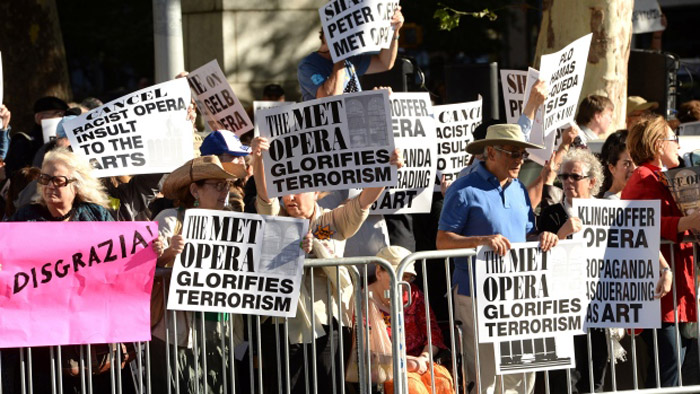The Death of Klinghoffer, composer John Adams’s opera about the Palestinian Liberation Front’s 1985 hijacking of passenger ship MS Achille Lauro and subsequent murder of handicap passenger Leon Klinghoffer, began its run at New York’s Metropolitan Opera Monday night.It was greeted by hundreds of protesters demanding that the company cancel the opera on the grounds of it being anti-Semitic and sympathetic to terrorists. Despite the protestors’ noble intentions, there are several major problems with this.
First of all, as cited by classical music critic Fred Plotkin in his WQXR article “The Depth of Klinghoffer: What Does the Controversy Say About Freedom of Expression,” most of the protestors have not seen the opera staged, heard its music, nor read its libretto. Without having experienced the work, there’s simply no way for the protestors to fairly assess whether or not it’s anti-Semitic. Their unfamiliarity with it means that they are judging the opera solely based on second-hand accounts, which themselves are likely to be highly biased. The protesters’ lack of understanding also makes it difficult to engage them in dialogue, because their opinions are drawn from emotional instincts rather than facts. They’re calling for censorship, but they have a limited conception of what it is they want to censor. Rather, they are operating based on the sort of thinking that has fuelled censors for hundreds of years—they want to suppress art solely based on its potential to propagate opinions contrary to theirs.
Of course, not all of the protesters are wholly unfamiliar with Klinghoffer, but the arguments of the more informed dissidents are still unsettling. Former New York City mayor Rudy Giuliani, in his Daily Beast article “Why I Protested The Death of Klinghoffer,” claims to have listened to a recording of the opera and read its libretto multiple times. Though he admires the music, he refers to the libretto as “factually inaccurate and extraordinarily damaging to an appropriate description of the problems in Israel and Palestine, and of terrorism in general.” His disgust led him to join the protestors in calling for the Met to cancel their scheduled stagings.
Art, and music in particular, has the potential to be dangerous, captivating, and inspirational—and that’s a beautiful thing. Those who want to deny the world of that beauty seem to understand this concept better than anyone: Just look at Josef Stalin’s censorship of composer Dmitri Shostakovich. As a society that constitutionally protects free speech, we should be encouraging the expression of various viewpoints.
Of course, these viewpoints include opinions such as those of Giuliani—but the problem lies in what he hopes to gain from his dissent. Critique is a perfectly legitimate way to react to art, but calls for censorship are not. Giuliani and the rest of the protestors could stand to learn from the feminist video game critic Anita Sarkeesian, who has been mistakenly dismissed by the “GamerGate” movement as arguing in favour of censorship. In the compelling and enlightening videos on her YouTube channel Feminist Frequency, she analyzes the harmful stereotypes and tropes of women that have been present in video games since the birth of the medium. She doesn’t call for an outright ban of any of the titles which she criticizes; rather, she merely draws viewers’ attention to their flaws.
Sarkeesian’s approach is ultimately more beneficial to her aims than that of the Klinghoffer protestors, because she allows impartial viewers to see the problems which she illustrates. By contrast, the protestors’ goal of shutting down the opera—even if it were truly as anti-Semitic as they claim—would allow its ideas to gain power by cloaking their supposed insidiousness. Thanks to the lack of censorship in the United States, we have a powerful chronicle of the country’s history of racism through once acceptable forms of entertainment, such as Al Jolson’s minstrelsy in his film The Jazz Singer. Freedom of artistic expression allows for both the positive and negative aspects of a given time period to become part of historical record. Let’s not suppress it.








